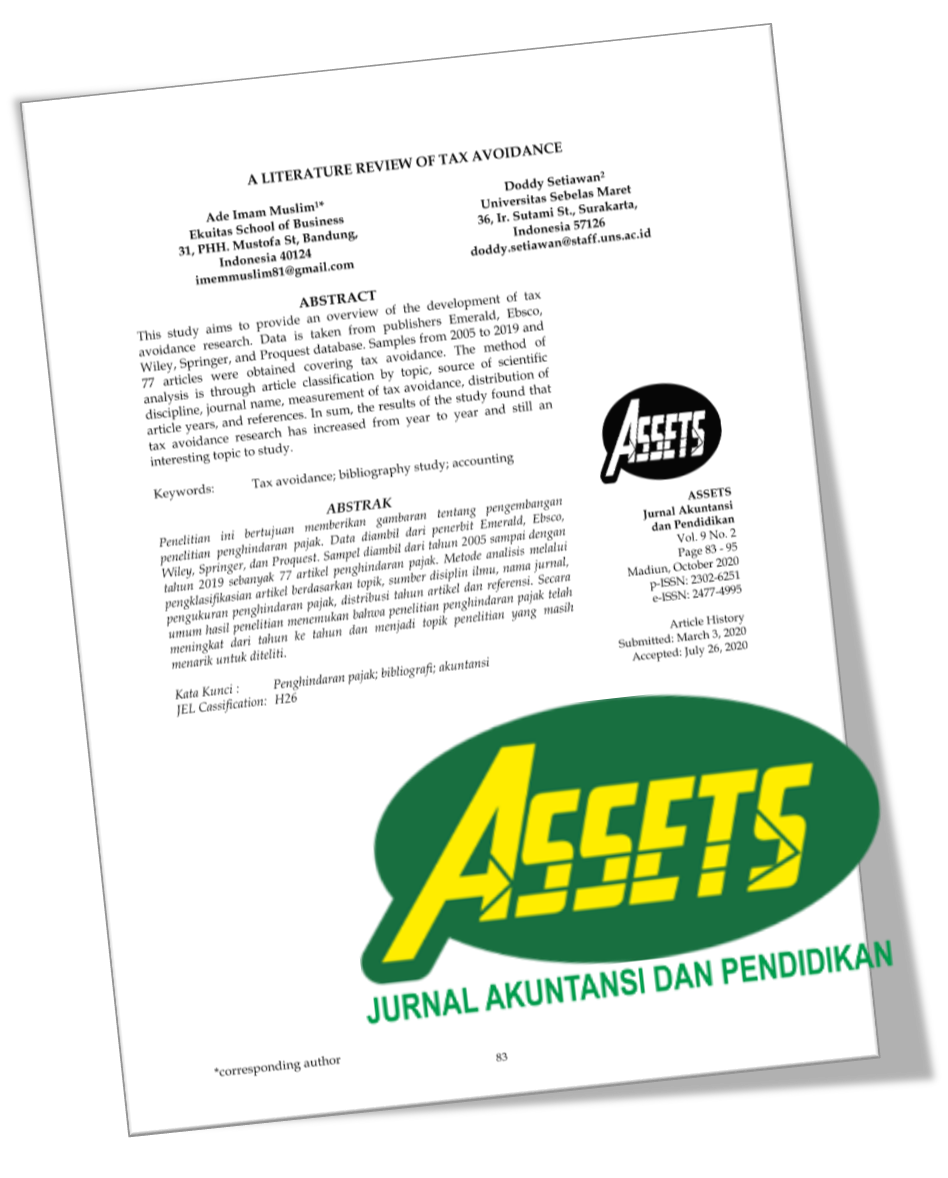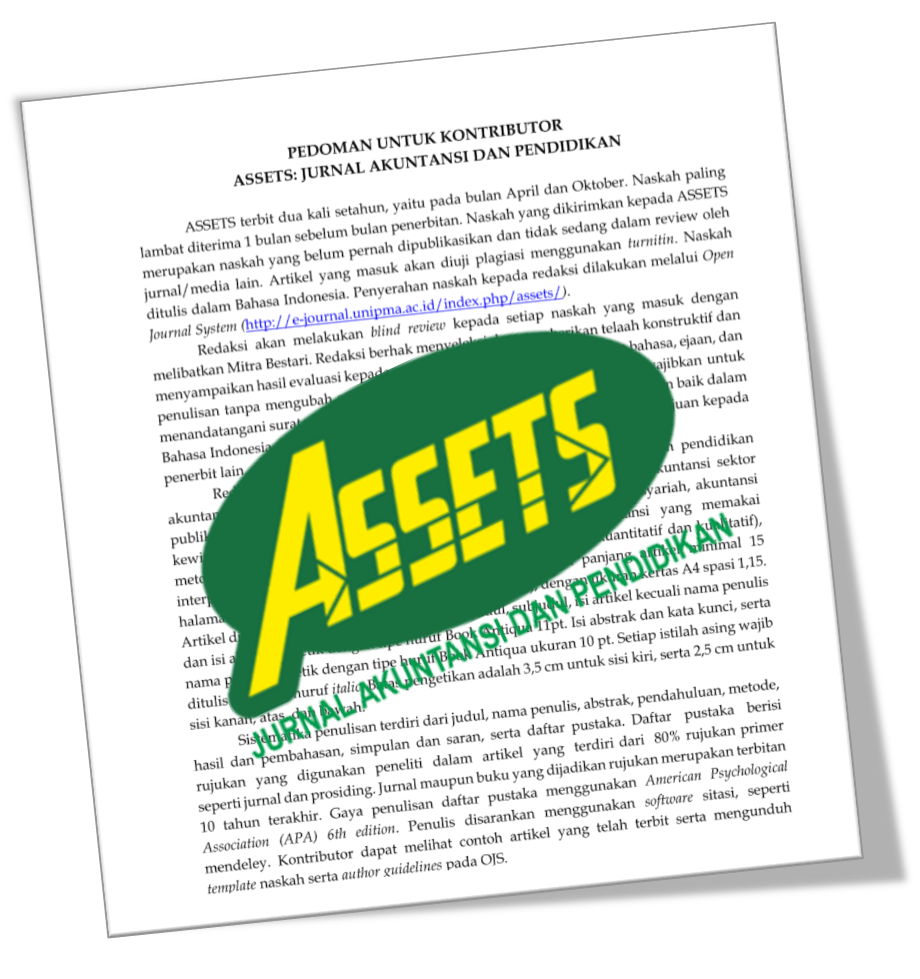Integrasi Budaya dalam Pendidikan Akuntansi untuk Mencapai Keunggulan Kompetitif Lulusan
DOI:
https://doi.org/10.25273/jap.v8i2.4112Keywords:
Pendidikan Akuntansi, Budaya, Diferensiasi, Keunggulan Kompetitif, accounting education, culture, differentiation, competitive advantageAbstract
ABSTRAK
Penelitian ini bertujuan untuk mengeksplorasi betapa budaya dapat menjadi alat diferensiasi bagi akuntan untuk mencapai keunggulan kompetitif. Hermeneutik digunakan sebagai alat analisis dalam penelitian untuk mencari nilai luhur yang terdapat dalam filosofi suatu budaya. Filosofi Sedulur Papat Kalimo Pancer (Jawa), Siri na Pacce (Bugis-Makassar), dan Tri Hita Karana (Bali) akan dieksplorasi dalam penelitian ini. Hasil penelitian ini menunjukkan bahwa budaya lokal tersebut memiliki nilai luhur yang bila diinternalisasi dalam pendidikan Akuntansi, akan dapat membawa Akuntan Indonesia memiliki keunggulan kompetitif dalam persaingan global. Nilai-nilai diferensiasi tersebut adalah tersebut adalah Ketuhanan, sinergi dan harmonisasi, dan etos kerja.
ABSTRACT
This study attempts to explore how culture can be differentiation instrumental for an accountant to achieve competitive advantage. Hermeneutics will be used to solicit the virtue values of the culture philosophy. Sedulur papat kalimo pancer (Javaneese), Siri na Pacce (Bugis-Makassar), and Tri Hita Karana (Balineese) will be explored in this research. The results of this study indicate that local culture has noble values which, when internalized in Accounting Education will be able to bring competitive advantage in the global competition. Those differentiation value are divinity, synergy and harmonization, and work ethic.
Downloads
References
Al-alak, B. A., & Tarabieh, S. (M. Z. A. (2011). Gaining Competitive Advantage and Organizational Performance Through Customer Orientation, Innovation Differentiation and Market Differentiation. International Journal of Economics and Management Sciences, 1(5), 80–91.
Boell, S. K., & Cecez-Kecmanovic, D. (2014). A hermeneutic approach for conducting literature reviews and literature searches. Communications of the Association for Information Systems, 34(1), 257–286.
BPS. (n.d.). Jumlah Penduduk Menurut Provinsi di Indonesia, 2012 - 2017 (Ribu Jiwa). Retrieved June 6, 2019, from https://jatim.bps.go.id/dynamictable/2018/03/08/371/jumlah-penduduk-menurut-provinsi-di-indonesia-2012---2017-ribu-jiwa-.html
Dahliani, D., Soemarno, I., & Setijanti, P. (2015). Local wisdom in built environment in globalization era. International Journal of Education and Research, 3(6), 157–166.
Eltivia, N. (2013). Menguak “Pancer†Integritas Akuntan dengan Filosofi Jawa. Jurnal Riset Akuntansi Dan Keuangan, 1(3), 173–180. Retrieved from http://ejournal.upi.edu/index.php/JRAK/article/view/6695
Eltivia, N. (2015). Internalisasi “Pancer†Dalam Jiwa Akuntan: Upaya Revolusi Perilaku Akuntan. Simposium Nasional Akuntansi Vokasi 2015 Menado.
Kafle, N. P. (2013). Hermeneutic phenomenological research method simplified. Bodhi: An Interdisciplinary Journal, 5(1), 181–200. https://doi.org/10.3126/bodhi.v5i1.8053
Lee, H. Y. (2008). A Comparative Study of Korean, Chinese, and Japanese Traditional Family and Contemporary Business Organizations.
Magfirah, S. (2016). Siri’ Na Pacce dalam Suku Makassar Perspektif Al-Qur’an dan Hadis. 7(2), 158–170.
Nakagane, K. (2017). China’s Economic Development and Sino-Japanese Economic Relationships: Beyond the Flying Geese Pattern Theory. Journal of Contemporary East Asia Studies, 2(1), 29–54. https://doi.org/10.1080/24761028.2013.11869056
Rahayu, S., Suhaeb, F., Sulkarnain, Anrisal, & Satnawati. (2018). Siri ’ Na Pacce Culture of Bugis-Makassar in the Context of Modern Life ( Overview Historicality and Theory Jean Baudrillard Simulation ). International Journal of Management and Applied Science,ISSN :2394-7926, 4(7), 62–65.
Riana, I. G. (2013). Dampak Penerapan Kultur Lokal Tri Hita Karana terhadap Orientasi Kewirausahaan dan Orientasi Pasar. Jurnal Teknik Industri, 13(1). https://doi.org/10.9744/jti.13.1.37-44
Said, N. (2004). Religion and Cultural Identity Among the Bugis. Inter-Religio, 45, 12–20.
Storper, M. (2009). Clark University. Economic Geography, 85(1), 1–21. https://doi.org/10.1126/science.11.277.620
Umiarso, H. H. (2011). Pendekatan Hermeneutik dalam Menghidupkan Tuhan: Sebuah Bunga Rampai. Yogyakarta: Ar Ruzz Media.
Wen-Cheng, W., Chien-Hung, L., & Ying-Chien, C. (2011). Types of Competitive Advantage and Analysis. International Journal of Business and Management, 6(5), 100–104. https://doi.org/10.5539/ijbm.v6n5p100
Published
Issue
Section
License
Perjanjian Lisensi dan Hak Cipta
Saat mengirimkan naskah ke jurnal, penulis menyatakan bahwa:
- Mereka diberi wewenang oleh rekan penulisnya untuk masuk ke dalam perjanjian ini.
- Karya yang dimaksud belum pernah diterbitkan secara resmi sebelumnya, kecuali dalam bentuk abstrak atau sebagai bagian dari kuliah, resensi, tesis, atau overlay jurnal yang diterbitkan.
- Karya yang dimaksud tidak sedang dipertimbangkan untuk diterbitkan di tempat lain,
- Publikasi karya yang dimaksud telah disetujui oleh semua penulis dan oleh otoritas yang bertanggung jawab - secara tahu sama tahu atau eksplisit - dari lembaga tempat pekerjaan itu dilakukan.
- Mereka mengamankan hak untuk mereproduksi materi apa pun yang telah diterbitkan atau dilindungi hak cipta di tempat lain.
- Mereka menyetujui lisensi dan perjanjian hak cipta berikut.
Hak Cipta
Penulis yang menerbitkan dengan ASSETS: Jurnal Akuntansi dan Pendidikan menyetujui persyaratan berikut:
- Penulis mempertahankan hak cipta dan memberikan jurnal hak publikasi pertama dengan karya yang secara bersamaan dilisensikan di bawah Lisensi Atribusi Creative Commons (CC BY-SA 4.0) yang memungkinkan orang lain untuk berbagi karya dengan pengakuan kepenulisan karya dan publikasi awal di jurnal ini.
- Penulis dapat masuk ke dalam pengaturan kontrak tambahan yang terpisah untuk distribusi non-eksklusif dari versi jurnal yang diterbitkan dari karya tersebut (misalnya, mempostingnya ke repositori institusional atau menerbitkannya dalam sebuah buku), dengan pengakuan publikasi awalnya di jurnal ini.
- Penulis diizinkan dan didorong untuk memposting karya mereka secara daring (misalnya di repositori institusional atau di situs web mereka) sebelum dan selama proses pengiriman, karena dapat menghasilkan pertukaran yang produktif, serta kutipan lebih awal dan lebih besar dari karya yang diterbitkan.
License and Copyright Agreement
In submitting the manuscript to the journal, the authors certify that:
- Their co-authors authorize them to enter into these arrangements.
- The work described has not been formally published before, except as an abstract or part of a published lecture, review, thesis, or overlay journal.
- That it is not under consideration for publication elsewhere,
- That its publication has been approved by all the author(s) and by the responsible authorities – tacitly or explicitly – of the institutes where the work has been carried out.
- They secure the right to reproduce any material already published or copyrighted elsewhere.
- They agree to the following license and copyright agreement.
Copyright
Authors who publish with ASSETS: Jurnal Akuntansi dan Pendidikan agree to the following terms:
- Authors retain copyright and grant the journal right of first publication with the work simultaneously licensed under a Creative Commons Attribution License (CC BY-SA 4.0) that allows others to share the work with an acknowledgment of the work's authorship and initial publication in this journal.
- Authors can enter into separate, additional contractual arrangements for the non-exclusive distribution of the journal's published version of the work (e.g., post it to an institutional repository or publish it in a book), with an acknowledgment of its initial publication in this journal.
- Authors are permitted and encouraged to post their work online (e.g., in institutional repositories or on their website) before and during submission, as it can lead to productive exchanges and earlier and more extraordinary citations of published work.

ASSETS: Jurnal Akuntansi dan Pendidikan is licensed under a Creative Commons Attribution-ShareAlike 4.0 International License.










